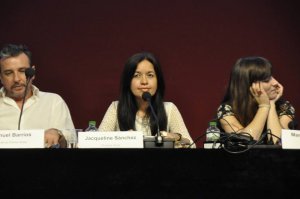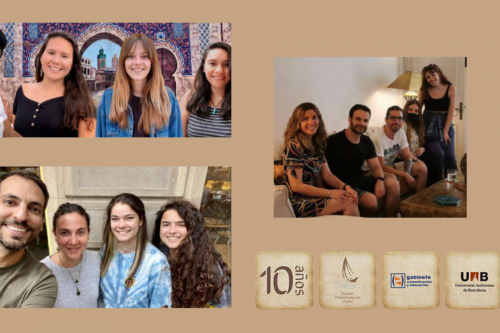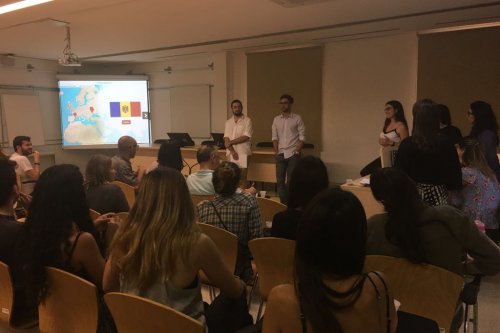


Languages
- Español
- English
Telekids: Why childhood is not for grown-ups

Children between 8 and 15 spend four hours a day watching TV, not to mention the time spent on other electronic devices; if the mind retains 10% of what we read, 20% of what we hear and 30% of what we see, technological tools dominate most part of the children's mind without any filters (Foundation Kaiser Family 2006).
But the root of the problem is not consumption itself but the quality of what is being produced on the other side of the screen. The sociological foundations of television state that it was built to inform, educate and entertain (Pérez Tornero), but the last of the three elements has obscured the previous two.
Looking for a possible solution to this problem and its effects, the Venezuelan communication and education professional, Jacqueline Sánchez started in the late nineties a program which has become an international reference for children's qualitative content: Telekids.
It is a children's program in which its producers teach workshops on screenwriting, production and directing of television and film to encourage children to begin to read audiovisual content critically: "If one knows how something is produced for television, it's easier to be critical and discard the trash content," explains Jacqueline Sanchez.
"We seek teamwork, the integration of different children and youth, the development of patience and the instilling of values to form a critical understanding of audiovisual material and its effects," said Sanchez in concluding her participation during the "2014 Filmed Learning Experiences;" an event where edu-communicators from all over the world shared their experiences in projects dedicated to improving the quality of media content.
In 2010 the University of Michigan launched a warning when they found that the number of hours children spend watching TV has a direct influence on their academic performance, a situation that Telekids resolved with an unusual but effective method: put them behind the cameras and make them responsible for the content.
Did it work?
In the 18 years that Jacqueline Sanchez has worked in favor of the qualitative development of children, her contributions through Telekids have been significant, particularly in Seville, where the workshop has directly worked since 1996. Perhaps its success is due to the unique method they use in their workshops, where children learn audiovisual production, construction of television programs, movies and other digital platforms. In addition, they write scripts, work cameras and practice editing, lighting, sound and presentation.
However, what has made Telekids transcend space and time is precisely the possibility that it gives children to learn about critical reading, analyzing the media in movies, cartoons, TV series, advertising and general information. So great has been the impact that international organizations confirm this.
In September 2012, the jury of the Festival Plural +, run by the United Nations Alliance of Civilizations (ONAOC), gave Telekids an award for its short film "Do you really think that about me?," created by the children of the workshop.
"Winning the award of the UN was the crown. We had participated thinking we could win any of the awards given but it was very important to receive the highest award because it was the recognition of many years of work. Not only do children run the audiovisual product, it is a life change that has generated results," said Sanchez.
From consumption to production
Dr. Sonia Ballano published in 2012 the results of her research which revealed that only 4.6% of children used Information and Communication Technology to create content. It also shows that 40% participate in forums and social networks, and the remaining 55.4% are considered passive readers.
With this media overview, the role of Telekids becomes more important because it not only teaches kids how to work with technological tools, it also fosters a critical attitude towards the media and elevates cognitive skills of participants. It is something like Socrates' "Maieutics," where the opportunity to participate fully in the construction of knowledge is provided.The mission of this program, as Sanchez says, is "to create awareness among children about the media: to show them how it works behind the screen and how they can make the most of its content, starting them on the path of critical and active viewing ".
From consumption to production
Dr. Sonia Ballano published in 2012 the results of her research which revealed that only 4.6% of children used Information and Communication Technology to create content. It also shows that 40% participate in forums and social networks, and the remaining 55.4% are considered passive readers.
With this media overview, the role of Telekids becomes more important because it not only teaches kids how to work with technological tools, it also fosters a critical attitude towards the media and elevates cognitive skills of participants. It is something like Socrates' "Maieutics," where the opportunity to participate fully in the construction of knowledge is provided.
The mission of this program, as Sanchez says, is "to create awareness among children about the media: to show them how it works behind the screen and how they can make the most of its content, starting them on the path of critical and active viewing ".
Participants, aged between 8 and 12, divided into groups of no more than 10, have come from different parts of the world such as Venezuela, Colombia and Mexico. The plan is to involve parents in future workshops which is still an idea being pursued.
Telekids hopes to reach every corner of the world where media content requires improvement, but not from the adult point of view in daily production, but rather from the sublime point of view of those who have demonstrated a voice to defend their rights: children.




